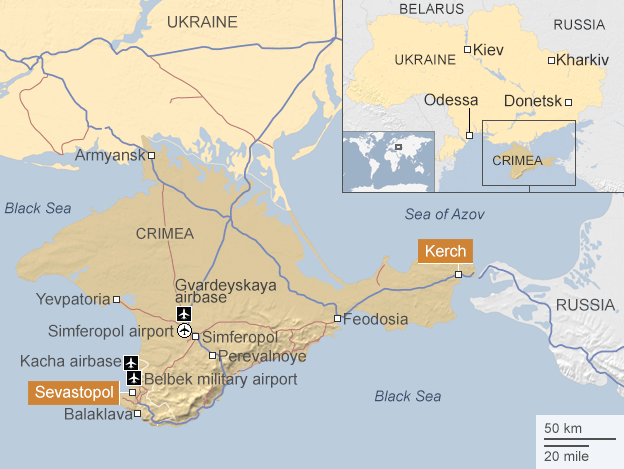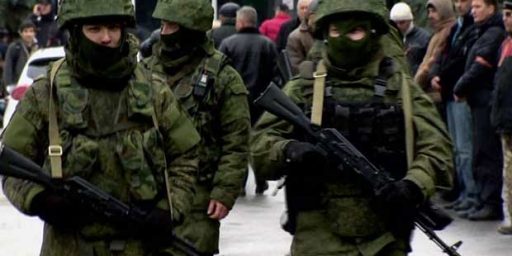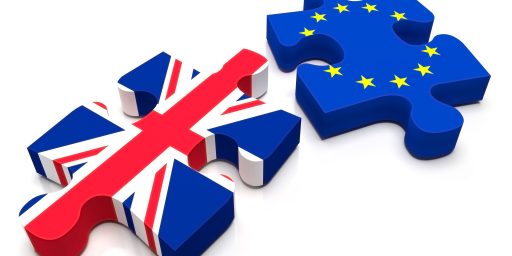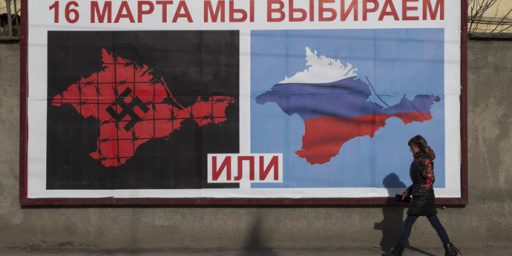On the Crimean Referendum
More on the pending referendum and some thoughts on elections in authoritarian contexts.
 Stephen Saideman writes (In Crimea’s sham referendum, all questions lead to ‘yes’):
Stephen Saideman writes (In Crimea’s sham referendum, all questions lead to ‘yes’):
The language of the new Crimea Referendum makes Quebec’s referendums appear to be models of clarity. According to the Kyiv Post, voters in Crimea next Sunday will be asked whether they support the union of Crimea with Russia (an act of irredentism) or whether Crimea should be independent (secession). There is no alternative – one cannot vote for the status quo ante of remaining within Ukraine.
This would suggest that the referendum might just be a bit of a sham.
Indeed.
(Saideman links to the ballot here, and I have posted it below as well—although it is in Russian, so I will have to trust that it has been translated properly).
Of course, the very short electoral calendar, the presence of Russian troops, and the manipulation of the local government are also clues to the, well, shamocity of it all.
Saideman also notes that international observers will not be allowed to witness the vote. He also notes the following:
Certainly Vladimir Putin and his friends in Crimea are not concerned with impressing the international community with how free and fair this referendum will be. Otherwise, they might not be printing about 66 per cent more ballots than needed (2.5 million ballots for 1.5 million Crimean voters).
(Those numbers were reported by the UPI here).
And to partially address a question that Doug Mataconis raised about a different authoritarian context:
those who disrespect democracy still feel compelled to use the guise of democracy to appear less authoritarian and more legitimate. It may not play well outside of Russia, but it might do ok within.
Indeed, some scholars have found that these kind of elections can be used to scare the opposition. That is, holding such an event puts opponents in difficult positions, as the fakeness may actually suggest that the government is strong, rather than weak.
Further, a referendum of this type always creates a dilemma for opposition forces. Do they show up and vote, in the hopes of defeating the referendum, but in so doing partially legitimize the process by participating (as well as inflating turnout numbers)? Or, do they boycott, which guarantees that the authoritarian’s preferences will win overwhelmingly? After all, if the opposition stays home, the results are foregone, even if with minimal to no cheating. Also: if the opposition vehemently campaigns against the measure, or protests the process, it is marking itself for easy targeting by the regime. (Plus, as noted above, heads the Russian win, tails the Ukrainians lose—this process is rigged from the start).
Of course, Saideman does note: “faked elections can serve as focal points for political protest. And these protests can help to bring down governments (see Ukraine last month).”
I will say this: this is not a democratic solution by any measure of the term.







With other words, when the freedom loving Ukrainians peacefully stormed their parliament and democratically voted in a new government of the highest ethical standards (well, but for the Nazi, but can’t have everything) that was great, but when the communist fascist Russians violently occupied their parliament and totally authoritarian voted for a new sham government that violated all rules of civilized countries. And the audacity of copy Wilson’s method of 1918 to legitimize land grabs under the disguise of independence votes, outrageous.
@Mu: Mobocracy is one thing. Occupying a country and foisting a “referendum” on its citizens to legitimize your occupation is a different magnitude altogether. You tried valiantly to equate the two, I’ll give you that.
As Mu pointsout here, neither side has complied with the highest democratic standards. The current Ukrainian regime may be non-democrats, but by God, they’re OUR non-democrats.
@stonetools:
At the same time, I have to take issue with the idea that what happened in Kiev was some kind of fascist inspired takeover. There had been widespread, pluralistic, and largely peaceful protests since November, until the Berkut was unleashed, and protest leaders began disappearing. Everything went out the window after that.
I recognize I’m saying this from within my own information bubble, and with my own preconceptions, but I definitely view one side as more justified.
@stonetools:
In Kiev we still have the democratically elected parliament. One can argue over whether their vote that Yanukovych had vacated the presidency is constitutional or not (that would be a matter for the constitutional court to decide, however, not the Russians, but Yanukovych has not sought constitutional relief, he has sought the support of an outside power). So one can rightly say, as a friend of mine did the other day, that the Ukrainian government is operating in a constitutionally gray area, but it is far, far more linked to democratically legitimacy than what is going on in Crimea (and I say that also knowing that Ukrainian democracy is far from perfect). Still, there is in fact no contest in this comparison. Anyone trying to make these situations equivalent is vastly over-simplifying the situation. (and ignoring key facts, I would argue).
Heck, even if we take the worse possible interpretation of event as driven by a Ukrainian mob in Kiev, at least it was, you know, a Ukrainian mob. The troops in Crimea are from another country.
(Note I am not taking that position, and further I am not endorsing any actions taken, but trying to distill a key aspect of the comparison here).
@Steven L. Taylor:
Amen.
Are they only printing the ballot in Russian? My understanding is that there are a fair number of non Russian speakers even in Crimea. Is any effort being made to accommodate them, or is language another part of the manipulation?
The correct translation of the two choices on the ballot
The 1992 Crimean constitution does not mean secession, it means autonomy. Before the Russian takeover, the Crimean parliament was already planning to hold a referendum on autonomy, which Kiev was resisting. So the referendum does have an option for staying in Ukraine.
@gVOR08:
The ballot is in three languages: Russian, Ukrainian and Tatar.
@BubbaHoTep:
If true (I say this only b/c I can’t speak any of the relevant languages, so what do I know?), it makes this much less of a sham. It’s still got the whole “occupied by Russian troops” thing going on, of course.
@BubbaHoTep: the major problem is that there’s no option for voters to support the status quo ante (i.e. the same level of autonomy Crimea enjoyed prior to the Russian incursion), which presumably would have been an option in the original referendum. It’s unlikely many of the the Tatars or the Ukrainians in Crimea favor greater autonomy or annexation by Russia.
The Crimean invasion was justified as 1) by invitation even though the leader abandoned his position, and 2) protecting Russians even though they weren’t threatened much less harmed. Isn’t international law (for what it’s worth) clear that the invasion itself is illegal? If so, what would be the basis for recognizing the annexation?
I’m coming around to the position that this’ll be the model for taking the eastern Ukraine too. Sadly for Ukraine, the ball’s in the EU’s court,
@rudderpedals:
Crimea is much easier to take because (1) it is much more defensible militarily, being a peninsula (2) it has a Russian-majority population that has never felt loyalty to Ukraine. Neither apply to the eastern Ukraine, which has no defensible boundaries and is split in its loyalties.
What has been most surprising to me is how extremely competent Russia turned out to be in executing this takeover, both the military seizure, which they managed without firing a shot, and the political manipulation, which has been very well organized. If only the US was as competent after taking over Iraq, maybe it wouldn’t have degenerated into such a quagmire.
I want to underscore BubbaHoTep’s interpretation of the ballot. The ballot is presented in Russian, Ukrainian, and Tatar. All three use Cyrillic so it might be a bit misleading for most Americans.
I don’t read Tatar but the Russian and Ukrainian support BubbaHoTop’s interpretation.
Said another way, there really isn’t much to see here.
@Steven L. Taylor:
Oh I agree they’re not equivalent. But let’s not pretend that the Ukrainian regime is simon pure.We’re dealing with dark grey and light grey, not black and white.
I suppose my position here is colored by my reading of “Sleepwalkers” , an account of the road to World War One. I was raised to believe that the power mad Germans were solely to blame, and that Britain and France were on the side of good. Wrong again, Bob. Lots of blame to go around and if anything the Serbs were in the wrong and Austria Hungary in the right.
I agree that the Russians have acted badly on this, and that the coming referendum is undemocratic. But if you pull back and take a broad view of this, things aren’t so clear and we are not all Ukrainians now.
@rudderpedals:
I’m guessing Russia at some point will point at the ongoing annexation of the West Bank by Israel.
@Rob in CT:
Which, I would argue, would make the whole thing problematic regardless of the language on the page.
@Chris Lawrence:
Exactly, so as such, Dave Schuler, I disagree that there is nothing to see here. (For that matter, I would need to more carefully examine what the 1992 option would really mean.
@stonetools:
Did I?
To risk sounding really snarky: welcome to politics, yes? And again, I didn’t claim black and white. Although in this case I think we are comparing gray to black. It may be constitutionally questionable that the parliament can select a temporary president, but it also true that Yanukovych has vacated his post (and, again, he is not appealing to the courts, the constitution, or even the people of Ukraine for recourse, he is appealing to a foreign military, that says something in and of itself). So, that is the gray area in Kiev. In Crimea, meanwhile, we have a military occupation in which the local government has been directly manipulated, and when a snap election is being held on the future of the territory and its citizens, that’s pretty black as far as I can tell.
Again, I never claimed anything of the sort. Its it possible that you think I hold a view that I have not articulated or that you think of me as a surrogate for some other position on this topic that goes beyond what I have actually written?
@rudderpedals:” Isn’t international law (for what it’s worth) clear that the invasion itself is illegal?”
I’ve read probably a dozen legal opinions on the invasion, primarily at Opinio Juris, and I’ve not seen one that didn’t conclude that it was illegal. Some specifically reject the argument that the Kosovo invasion justifies the Ukrainian invasion on the grounds that Kosovo was illegal.
“If so, what would be the basis for recognizing the annexation?”
I believe that any annexation will not be recognized by the international community. In the modern era they generally are not, unless the context is seen as colonial. The referendum occurred under an illegal outside occupation, Ukraine is not known for clean elections, and the referendum violates the Ukraine Constitution because its not a referendum of the whole country. It may not make any practical difference; the international community does not recognize China’s annexation of Tibet, but it will be a small festering sore in diplomacy.
@Steven L. Taylor:
Well, I guess I am really going against the John McCain neo-con position, rather than what you said, so I stand corrected here.
Here’s the problem. Americans put the black hat on the guy they go to war with. That’s why I’m reluctant to put the black hat on Putin, because the next move the neo-cons will be recommending is to roll tanks, because you don’t negotiate with the guy in black hat. You might be saying at that point “Wait let’s talk nuance and there’s another step before tanks.” How did that work out for Kerry in therun up to the Iraq War ?
Guess Iraq has made me gun-shy about how I characterize foreign actors. Sorry if your point got caught up in that.
@PJ:
Why not? It’s just like Russia was attacked from Crimea along with all of the other nations bordering Russia.
Facts be damned. Everything tossable goes into the Cuisinart if it rationalizes the Russian invasion.
@stonetools: To be clear: I am not advocating military intervention here.
@rudderpedals:
I can’t locate it now, but there’s a New Republic article that suggests that the likely model for what will happen is the Turkish action in Cyprus. Note in that case the Turkish action was far more justifiable (there really was evidence of Greek opression of Turkish Cypriots). Nevertheless, the Turkish action (invasion of CYrus and partition) was condemned,and the client state Turkey set up in northern Cyrus has been recognized only by Turkey. Nonetheless, there has been a de facto partition of the island that has lasted to this day and that shows every sign of continuing.
I expect that the de facto annexation of Crimea will never be ratified by international law, but that its going to continue , absent military action by NATO to restore the status quo ante.
@rudderpedals:
Let’s be blunt. The Russian takeover of Crimea cannot be justified. But it most likely cannot be reversed.
Maybe we should give it the good old college try. But these things have a habit of not being reversed. Just ask Mexico.
@rudderpedals:
That Israel was attacked doesn’t matter, the annexations still aren’t legal. Try again.
@PJ:
I think you need to recalibrate your snark meter.
https://twitter.com/ru_rbc/status/443266001707081728/photo/1
“Leaflet Text: Sunday 16 March. We will chose a future for our children. Give two answers to two questions.
1. Are you for reunification of the Crimea with Russia with the rights of a subject of the Russian Federation? Answer YES!
2. Are you for restoration of the 1992 Constitution of the Republic of the Crimea and for the status of the Crimea as a part of Ukraine? Answer NO!
Answer YES to the first question, NO to the second question and we will go into Russia, we will have the pensions and wages of Russia. The average wage of Russians is 6000 hryvnia, and the size of the pension is 2400 hryvnia. Mighty Russia will protect our families. As a part of a mighty, multi-national country, our culture and traditions will be protected.
If you answer NO to the first question and YES to the second, we will once again return to 1992, when the Ukrainian neo-Nazis through blackmail and bribery gradually stripped us of everything. Already starting in April of this year, residents of Ukraine will face a price hike of double for gas and 40% higher for electricity, and an increase in the pension age by 3 years. All benefits and supplements are being liquidated.
We want to live, and not survive!
Russia – YES!
Ukraine – NO!”
The propaganda is flowing at full force already. Russia hasn’t lost a step in the propaganda department. Between these leaflets, the billboards and the take over of most Crimean TV and radio stations Moscow is going full bore.
@rudderpedals:
It’s a violation of the UN Charter, but only if the Security Council declares it so.
@PD Shaw: I concur completely. What little I know about this was mostly gleaned from the stuff at Opinio Juris supplemented with the thread at Dave’s place. The Sudetenland parallel you raised over there is right on.
@stonetools: I too don’t see the way to reverse the invasion. And if the Europeans who have the most to lose don’t want or can’t afford sanctions to deter Putin taking the historical eastern Ukraine cities they’re going to go too I think.
For those who in an earlier thread implied I was crazy to worry about the Baltics since they are NATO members:
Yes, I just linked to Hot Air.
@michael reynolds:
Grasping at straws then? 😉
BTW, did you know that 13% of the people living in Latvia aren’t citizens of any country?
After the dictatorship of Franco, Spain didn’t become a fully democratic state until 1982.
And this.
Should we worry about the Spaniards too?
😉
@PJ:
Are the Spaniards nuclear powers? Are they currently seizing the territory of a sovereign state? Are they massing troops on anyone’s border? Are they ruled by an authoritarian who openly pines for empire?
@PJ: Should we worry about the Spaniards too?
No. No one expects the inquisition.